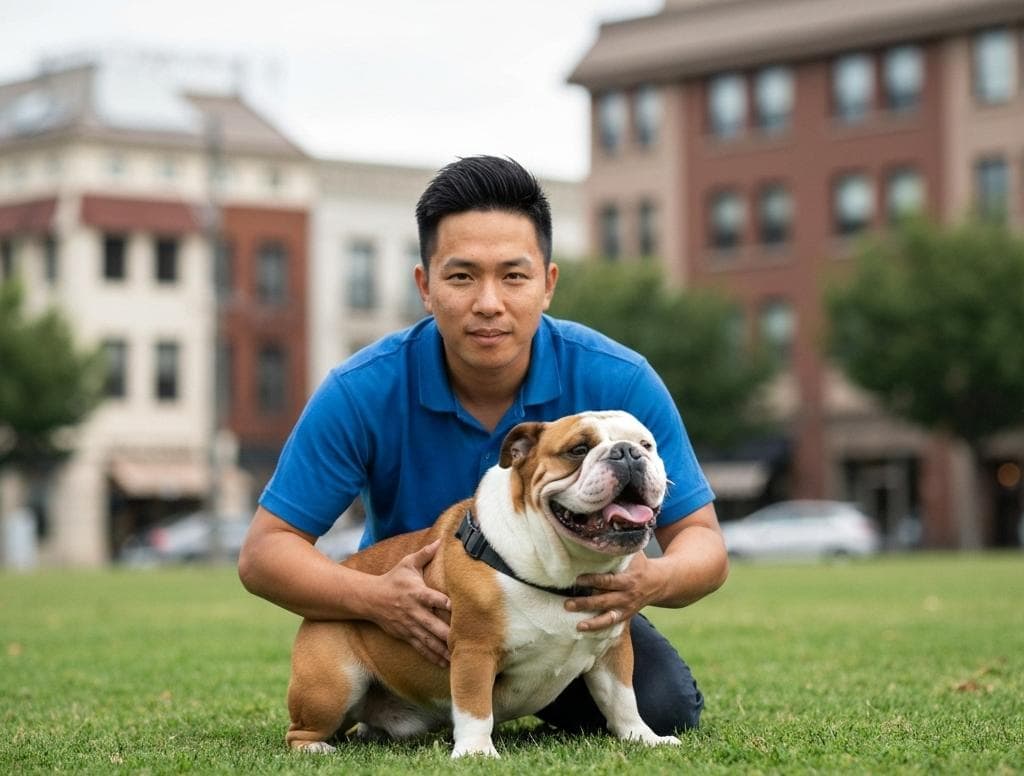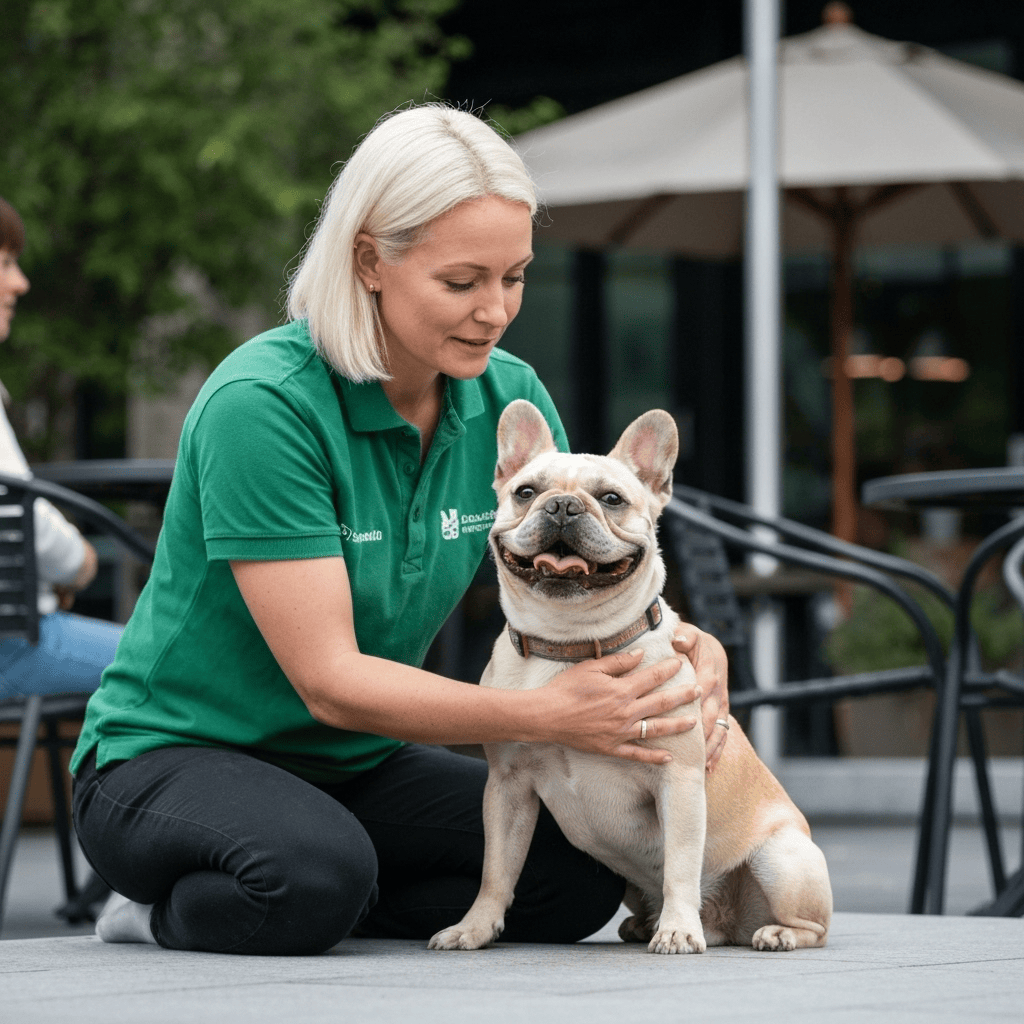Your Complete Guide to Choosing a Dog Trainer in Houston
When you walk your dog through Houston’s bustling neighborhoods, you quickly realize that good training makes all the difference. From the packed trails at Buffalo Bayou Park to the busy sidewalks of Montrose and The Heights, your dog encounters distractions that require solid skills and calm confidence.
The best Houston trainers understand our city’s unique challenges. They know that dogs here need to handle everything from downtown crowds to apartment living, from off-leash dog parks to outdoor patios in the heat.
How to Choose the Right Trainer
Finding the right trainer in Houston starts with understanding what actually works for dogs. Positive reinforcement training builds the trust and communication your dog needs to succeed in our busy city environment.
When you talk to potential trainers, ask them to explain how they use treats, toys, and real-life rewards to teach new behaviors. Avoid anyone who relies on fear, intimidation, or painful corrections – these methods often backfire in high-stress situations like busy Houston streets.
Professional education matters, especially in a large market like ours where anyone can call themselves a trainer. Look for credentials like CPDT-KA, KPA-CTP, or IAABC-CDBC. These certifications show that your trainer has studied animal behavior and committed to ongoing education.
If you live in high-traffic areas like Midtown or near the Galleria, ask how the trainer prepares dogs for heavy distractions and tight spaces. Some trainers only work in quiet classrooms, but Houston dogs need skills that transfer to real life.
For group classes, find out about class sizes, vaccination requirements, and where sessions meet. If a trainer uses public parks, they should understand City of Houston permit requirements.
Common Training Methods That Work in Houston

Houston’s environment calls for training methods that actually hold up when your dog faces real challenges. Here’s what works best for dogs living in our city.
Positive reinforcement training teaches your dog what you want them to do by making good choices rewarding. This approach works particularly well for basic obedience, puppy training, and addressing behavior problems without creating new fears.
Private lessons give you focused time to work on specific challenges like leash pulling, reactivity to other dogs, or separation anxiety in your apartment. The best private trainers will meet you where problems actually happen – in your building’s lobby, on your usual walking route, or in your backyard.
Group classes provide controlled socialization and help your dog practice staying focused around other dogs. Look for small class sizes and trainers who can manage multiple dogs safely.
Day training programs have the trainer work with your dog during the week, then teach you what they’ve learned. These can jump-start progress, but only if the program includes thorough owner education so behaviors stick when you take over.
For serious behavior issues like fear or aggression, ethical trainers use desensitization and counter-conditioning – gradual exposure combined with positive experiences. This patient approach takes time but creates lasting change without making problems worse.
What Training Costs in Houston
Training prices in Houston vary based on the trainer’s experience, your neighborhood, and how much support you need. Here’s what most dog owners can expect to pay.
| Service Type | Typical Price in Houston | What’s Included |
|---|---|---|
| Group classes (4–6 weeks) | $160 – $300 total | Basic obedience or puppy classes, small to mid-size groups |
| Private lessons (60–90 min) | $110 – $185 per session | Custom coaching at home or a local park |
| In-home training packages (4–6 lessons) | $420 – $900 total | Step-by-step plan, homework, messaging support |
| Day training (trainer works dog + handoff) | $500 – $950 per week | 3–5 pro sessions/week plus owner lesson |
| Board and train (2–4 weeks) | $2,200 – $4,800 total | Daily pro training, updates, go-home lessons |
| Behavior consultation (reactivity, fear) | $150 – $275 initial | History review, training plan, follow-up options |
Expect higher rates in premium areas like the Galleria district or Inner Loop neighborhoods. Many trainers offer free phone consultations to help you understand which services make sense for your situation.
Houston Rules Every Dog Owner Should Know
Understanding local regulations helps you train your dog while staying on the right side of the law. Houston and Harris County have specific requirements that affect how and where you can work with your dog.
Leash laws require dogs to be leashed in all public areas except designated off-leash dog parks. You can find current park locations and rules at Houston Parks & Recreation Dog Parks.
The city requires all pets to be microchipped and registered through BARC. This is different from traditional dog licensing and helps reunite lost pets with families. Get details and services at BARC Animal Shelter & Adoptions.
Rabies vaccination is required statewide for all dogs. Your veterinarian can provide the certificate you’ll need for training classes and boarding. Texas guidelines are available at Texas DSHS Rabies.
If your dog’s barking becomes a neighborhood issue, the city can issue citations for noise violations. Good training programs address barking through enrichment and teaching calm behaviors – especially important if you live in apartments or townhomes.
Professional trainers who use city parks may need permits for commercial activities. Check requirements at Parks Permits.

Questions to Ask Before Hiring a Trainer
The right questions help you find a trainer who matches your dog’s needs and your family’s values. Here’s what to ask during your initial conversation:
- What positive methods do you use to teach new behaviors without fear or intimidation?
- Which professional certifications do you hold, and how do you stay current with training techniques?
- How will you adapt your program to work with my neighborhood’s specific challenges?
- What training format (group classes, private lessons, day training) would work best for my goals?
- How do you measure progress and decide when to increase difficulty?
- What’s included in your pricing, and are there additional fees for travel or equipment?
- Do you carry liability insurance, and can you provide proof if my building or a park requires it?
- For behavior problems, do you work with veterinarians when medical issues might be involved?
- What kind of daily practice will I need to do between sessions?
Local Resources for Houston Dog Owners
Houston offers several resources that support your training efforts and help you enjoy the city with your dog.
Johnny Steele Dog Park at Buffalo Bayou Park provides excellent off-leash exercise and socialization opportunities. Find current information at Buffalo Bayou Partnership.
The city maintains multiple dog parks throughout Houston, including popular spots like Levy Park Dog Park and T.C. Jester Dog Park. See the complete list and rules at HPARD Dog Parks.
For city requirements, microchipping services, and other pet resources, visit BARC Animal Shelter & Adoptions.
Harris County residents outside city limits can find pet-related information at Harris County Pets.
If you enjoy day trips to state parks for training adventures, check pet policies at TPWD Pets in State Parks.

Common Questions
How much does in-home dog training cost in Houston?
Private in-home sessions typically run $110 to $185 per lesson. Multi-session packages range from $420 to $900, depending on your goals and how far the trainer needs to travel.
Is in-home training worth the extra cost?
In-home training often provides better results because you’re working where problems actually happen. Your dog learns to behave well in your building’s elevator, on your usual walking route, and around your specific neighborhood distractions.
Can I hire someone to house train my dog?
Yes, many trainers offer house training programs that combine day training with owner coaching. The key is making sure you understand the routine so your dog stays consistent when you take over.
What is the 3-3-3 rule for dog training?
This guideline suggests that new dogs need about 3 days to decompress, 3 weeks to learn your routine, and 3 months to fully settle in. Good training programs respect this timeline and build skills gradually rather than rushing progress.
How long will training take to see results?
Basic obedience skills usually develop over 4 to 8 weeks with consistent daily practice. Behavior issues like reactivity or separation anxiety typically require longer, more structured programs with regular professional support.
What should I bring to my first group class?
Pack a properly fitted collar or harness, a 6-foot leash (not retractable), lots of small, soft treats, water for your dog, and vaccination records if the trainer requires them.
What’s Houston’s leash law?
Dogs must be on leash in all public areas except inside designated off-leash dog parks. The city maintains current park locations and rules at HPARD Dog Parks.
Do I need a dog license in Houston?
Houston requires microchipping and registration through BARC rather than traditional licensing. If you live in unincorporated Harris County, check current requirements with Harris County Pets.
What vaccinations does my dog need for training classes?
Rabies vaccination is required by state law. Most trainers also require current distemper, parvo, and bordetella vaccines. Your veterinarian can advise you based on your dog’s age and health status.
Do dog trainers need licenses in Texas?
No special license is required for dog trainers in Texas. Look for professional certifications, transparent training methods, and liability insurance as indicators of quality and professionalism.
Where can I practice off-leash recall safely?
Use fenced dog parks like Johnny Steele Dog Park and others listed on the city’s website. Keep your dog leashed everywhere else – it’s the law and keeps everyone safer.
Can I train my dog at Houston’s dog parks?
Casual training and recall practice are fine at city dog parks as long as you follow posted rules and keep sessions brief and considerate of other users. Commercial training classes may require permits.
What trails and parks allow dogs for training walks?
Buffalo Bayou Park and Memorial Park offer excellent leashed walking opportunities with controlled distractions. For day trips outside the city, many Texas State Parks welcome leashed dogs – check specific rules at TPWD Pets in State Parks.
Should my trainer carry insurance?
While Texas doesn’t mandate specific insurance for trainers, reputable professionals carry general liability coverage. Many venues and HOAs require proof of insurance before allowing training sessions on their property.
Do positive methods work for aggressive dogs?
Professional behavior modification using desensitization and counter-conditioning is the standard approach for fear-based reactivity and aggression. Qualified trainers know how to work safely at appropriate distances while gradually building your dog’s confidence and changing their emotional response to triggers.
The best training programs in Houston combine practical skills with positive methods and plenty of real-world practice. Your dog needs to succeed not just in a classroom, but on your block, at your favorite park, and in all the places that make Houston life enjoyable.
Take time to ask good questions, review qualifications carefully, and choose a trainer who understands both dog behavior and what it takes to live well with a dog in our city.
